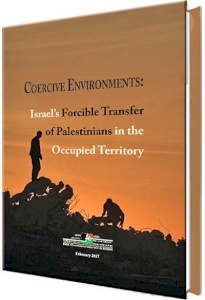Press Releases

PR/EN/280217/16
BADIL releases the legal study Coercive Environments: Israel’s forcible transfer of Palestinians in the occupied territory; an examination of systematic Israeli practices and policies creating a coercive environment leading to the forcible transfer of Palestinians today.
Understanding the scale and enduring nature of the forced displacement and transfer of Palestinians as well as the means by which Israel has pursued, and continues to pursue, this displacement is essential. Despite the consistency in jurisprudence and increasing number of reputable independent bodies and organizations acknowledging that Israeli acts and policies inside the oPt are contributing to a coercive environment for Palestinians, depriving them of choice, analysis often falls short of asserting a causal connection between Israeli practices and policies and the forced displacement of Palestinians. Consequently, the criminal nature of Israel’s actions and policies receives no consideration.
This report seeks to address that gap with the legal framework applied to six thematic groupings of forcible transfer: the case of Hebron, Palestinian herder communities inside Area C, punitive home demolitions, the residents of ‘seam zones’, punitive residency revocations and unlawful war practices inside the Gaza Strip.
It provides an authoritative, consensus-driven legal framework for the criminal offence of forcible transfer and 11 previously undocumented case studies which demonstrate the causal link between Israel’s actions and the forcible transfer of Palestinians. This report also provides evidence that not only are huge numbers of Palestinians at grave risk of forcible transfer, pursued through a multitude of Israeli practices and policies, but also that Israeli-perpetrated forcible transfer of Palestinians is happening in the present day.
This report is therefore intended to serve as an aid in diagnosing instances of forcible transfer both inside the occupied Palestinian territory and in other geographic contexts, as well as assisting relevant actors in identifying and addressing scenarios which may give rise to this offence. Forcible transfer not only constitutes a grave breach of the Fourth Geneva Convention, confirming its status as one of the most heinous acts that can be committed within the context of international armed conflict, but it is also an act which commonly targets individuals and groups on the basis of their identity and thus serves to reflect and underpin broader, systematic forms of discrimination.
Given the gravity of the act of forcible transfer, the extent of its geographic spread across the West Bank, including East Jerusalem, and the Gaza Strip, and the scale and institutionalized nature of its commission, there exists a clear and pressing need not only to ensure a full understanding of this offence but also to marry this understanding with consistent employment of appropriate, legally-rooted terminology. Consequently, both the forcible transfer of protected persons out of the occupied territory and the implantation of the civilian population of the occupier into the occupied territory (colonization) are grave breaches of international law and should elicit third party states’ obligations.
Accordingly, BADIL:
- Calls upon third party states, UN and regional bodies and international and Palestinian non-governmental organizations in applying appropriate legal terminology to the present day reality in the oPt. Particularly, identifying that practices attributable to Israel - including home demolitions, widespread colonizer violence and harassment, and denial of access to essential services - and the resulting displacement, constitutes forcible transfer;
- Urges all relevant actors to continue to develop an understanding of what constitutes a ‘coercive environment’ for the purpose of identifying instances of forcible transfer of Palestinians inside the oPt;
- Calls upon High Contracting Parties to honor their obligation under Common Article 1 of the Fourth Geneva Convention to take all available measures to halt Israel’s perpetration of forcible transfer of Palestinians inside the oPt;
- Calls upon High Contracting Parties to honor their obligation under Article 146 of the Fourth Geneva Convention to search for individuals present in their respective territory who have materially participated in the forcible transfer of Palestinians and to either bring proceedings against such persons in their national courts under the principle of universal jurisdiction, or hand over such persons to a fellow High Contracting Party so that they may be brought before a court of law;
- Urges all organizations engaged with forced displacement inside the oPt to make all efforts to thoroughly research and document anecdotal accounts of forced displacement;
- Urges all organizations engaged with identifying forced displacement inside the oPt to ensure that their monitoring tools and systems allow for the collation of all information relevant to ascertaining the presence of forcible transfer;
- Urges all organizations engaged with identifying forced displacement inside the oPt to explore the feasibility of a central database for acts of forcible transfer.
